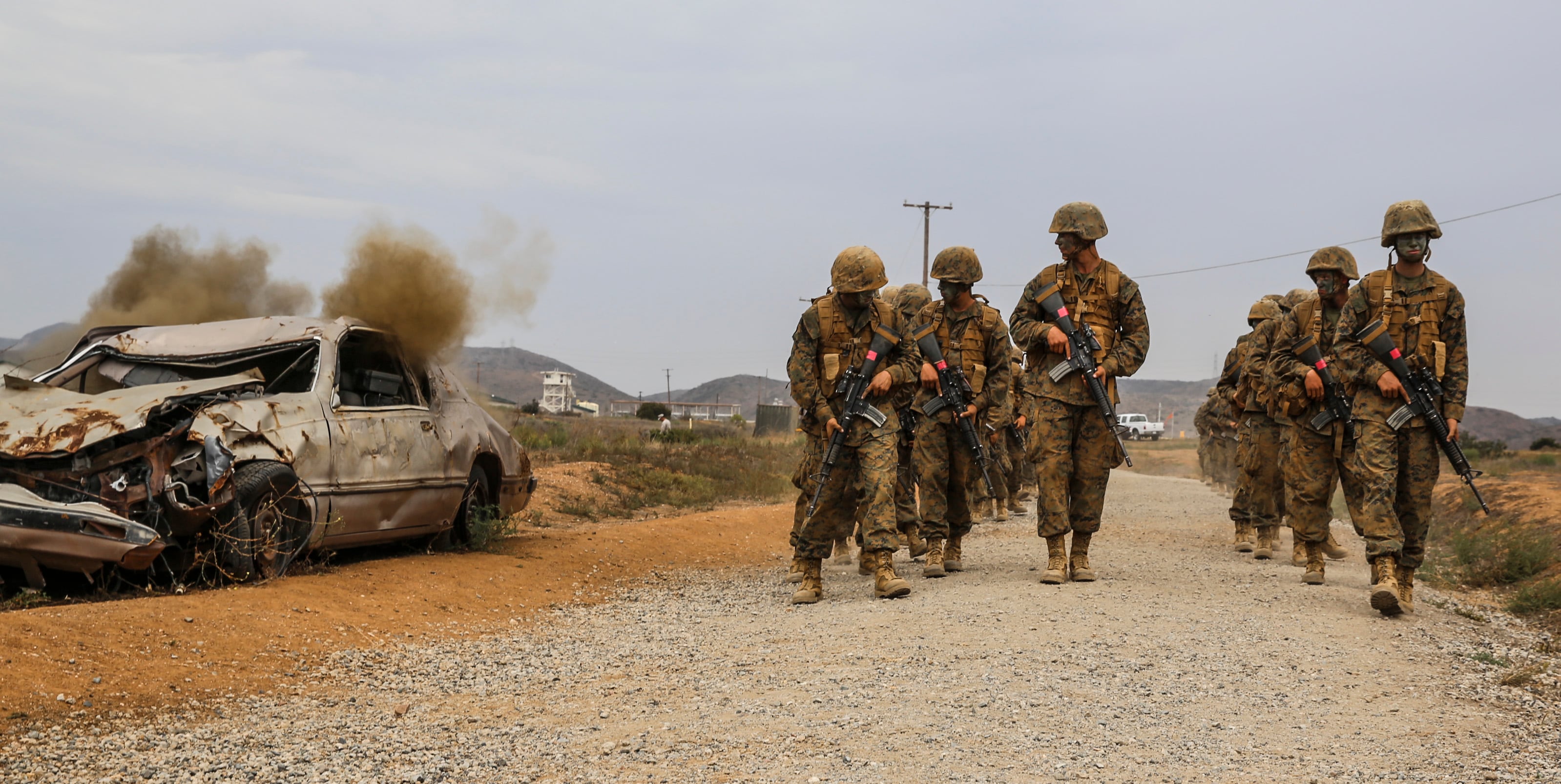Marine recruits completing the final grueling test at the end of boot camp will now face an event named for a Silver Star recipient who died in Afghanistan while trying to save his teammate. The legacy of a fallen Marine Silver Star recipient will now guide recruits undergoing the infamous Crucible final test at West Coast boot camp.
On Thursday, officials from Marine Corps Recruit Depot San Diego renamed the improvised explosive device course recruits face during the Crucible for complete at a dedication ceremony in honor of Cpl. Larry Harris Jr. The mortar fire team leader was credited with repeatedly braving enemy fire as he attempted to evacuate a wounded Marine during a 2010 deployment.
Harris' His story will be presented passed on to thousands of recruits who pass through training on the West Coast MCRD-SD every year, said Capt. public affairs director Cpt. Matthew Finnerty, a spokesman for the depot. Those recruits complete the Crucible at Camp Pendleton, California. said.
"Every Marine who goes through the Crucible on the West Coast will hear Cpl. Harris' citation, his sacrifice and how he served the Marine Corps and the country to save his fellow Marines," Finnerty said.
Harris was posthumously awarded the Silver Star "for conspicuous gallantry and intrepidity in action against the enemy," according to his citation.
On July 1, 2010, Harris and other members of 3rd Battalion, 1st Marines were on patrol in Helmand province in Afghanistan's Helmand province Province when the enemy began taking potshots at their squad, according to his citation. As Harris maneuvered to outflank them, the team began taking about 40 fighters opened up on his men with heavy small arms and machine gun fire from about 40 nearby fighters.
Harris was able to help his squad withdraw by repeatedly braving incoming fire to suppress the enemy. Repeatedly braving Constantly exposing himself to the incoming fire, Harris he suppressed the enemy while withdrawing his squad. When his machine gunner was shot in the leg took a round in the leg, Harris didn’t miss a beat. He ran to fallen Marine, scooped him up and began moving him to safety to prepare a medical evacuation.
"As he moved through a vineyard while carrying the wounded Marine, Cpl. Harris struck an improvised explosive device, absorbing the majority of the explosion with his body," his citation states. "Although his injuries would prove fatal, Cpl. Harris ultimately saved the life of the wounded Marine."
When one of the Marines who served with Harris on that deployment was later assigned to the recruit depot's Weapons and Field Training Battalion, Finnerty said the Marine When one of the 3/1 Marines that served with Harris was later assigned to Weapon and Field Training Battalion at MCRD-SD, he took it upon himself to try to have one of the Crucible’s events renamed in honor of the corporal Harris, Finnerty said.
"He put a package together for the command, and the command ultimately approved it," Finnerty said. "The timing of [the dedication] was based on when his family and his widow could come out."
That Marine has since left the Corps and was not available for an interview. Finnerty said officials at the recruit depot timed the dedication so Harris' family and Several other 3/1 Marines could attend. were also able to attend, Finnerty added.
The IED awareness course aboard Camp Pendleton, Calif. is the first time recruits are exposed to the types of blasts they could encounter IEDs in a combat environment. It was previously named the "John Quick Trail" in honor of Medal of Honor recipient Sgt. Maj. John Henry Quick’s actions in Cuba during the Spanish-American War.

Marine recruits patrol as a simulated improvised explosive device hits an abandoned vehicle during the Crucible at Camp Pendleton, Calif. That portion of the three-day test is now named for Silver Star recipient Cpl. Larry Harris Jr., who was killed in an IED blast in Afghanistan.
Photo Credit: Cpl. Jericho Crutcher/Marine Corps
The recruits learn how to identify IED and what to do if they encounter one, Finnerty said.
"The layout for the event itself is a trail with a number of small structures built along the way with a number of practice IEDs," he said. "There's smoke, they have sounds to signify when one would go off."
The IED lane is one of several trials recruits Marines-to-be endure as part of the final three-day Crucible, boot camp’s test of the skills and values learned during boot camp. Along the way, they learn about combat heroes like Harris in order to reinforce what it means to be a Marine. are sustained by true stories of Corps’ history - such as Cpl. Harris’ story - to reinforce what it means to be a Marine.
Once they complete the Crucible, the recruits earn the coveted eagle, globe and anchor and the title of Marine. previous 10 weeks of training before receiving the Eagle, Globe and Anchor.
The right of passage stretches recruits' physical and mental endurance to the max, offering food and sleep deprivation, forced marches and intense combat simulations over a grueling 54 hours.
Along the way they are sustained by true stories of Corps' history - such as Cpl. Harris' story - to reinforce what it means to be a Marine.
Matthew L. Schehl covers training and education, recruiting, West Coast Marines, MARSOC, and operations in Europe, Africa and the Middle East for Marine Corps Times. He can be reached at mschehl@marinecorpstimes.com.
